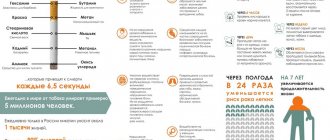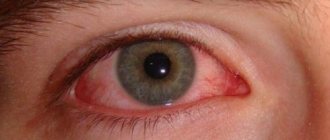Quitting smoking is supposed to be very difficult, so there are so many different techniques on how to do it. And at least one should help you in this difficult matter.
Hello everyone on my blog.
Today I want to offer an interesting technique - a calendar for a smoker who has quit smoking.
In this quit smoking calendar, I write out: what you need to do, how to prepare, how you will feel - by month, by day, and even by hour!
We know - prepared means armed!
I tried to describe as accurately as possible what happens when you quit smoking day by day. And everything that will be described below, I felt and tested on myself (22 years of smoker experience) and wrote it down in very, very detail!
The essence of the calendar is self-control, that is, you set tasks and goals for yourself, and control their implementation.
And so on for three whole years!
Nicotine
Nicotine is a plant-based drug found in tobacco leaves. They are dried, crushed and smoked in the form of cigarettes and less often with a pipe.
Smoking tobacco is a very common addiction, which, like love, “all ages are submissive to.” You can see both a primary school student and a venerable old man with a cigarette in his hands.
Smoking does not always bring pleasure; addiction quickly shows its unpleasant sides. Why then do people suffer when quitting smoking and reach for a cigarette again?
Psychological cravings in drug addiction
One of the aspects of drug addiction, including nicotine addiction, is psychological attachment to a psychoactive drug. Drugs, including nicotine, help a person relax, become more cheerful and relaxed, cheer up or forget about troubles.
People who, due to internal fears or attitudes, cannot build harmonious relationships with others or achieve success in their activities, often resort to such surrogates of sensations. They do not have enough strength or knowledge to receive this joy, freedom and satisfaction in reality. Nevertheless, the psyche becomes attached to such artificial states and seeks them again and again.
Gradually, life without a psychostimulant loses color, and stable psychological dependence leads to the fact that cigarette use becomes regular.
How many days do you need to go without cigarettes to quit smoking?
The very first thing you need to remember is that you don’t need to hold on. The more you hold on, the more strength and energy you expend, the more internal tension grows in you, and the more you want to smoke.
Relax, no matter how strange it may sound, there is nothing to fight with. But accepting the fact that you will need to live a different life is important.
But in general, if you take it by timing, the hardest days are the first three. The next week goes by quite simply. If quitting still continues to cause you a lot of discomfort, you may want to try a quit plan. With it, it will be much simpler and easier for you to quit smoking, without withdrawal symptoms and willpower and weight gain.
Physical dependence on tobacco
Constantly smoking cigarettes forms a physical dependence on tobacco, and hard times begin for the smoker. Now he is forced to smoke a cigarette every time so as not to experience withdrawal symptoms or smoking cessation syndrome.
Formed physical dependence is necessarily expressed in nicotine withdrawal. The fact is that the patient’s body is already accustomed to receiving the compounds necessary for its work through smoking, so when the dose is reduced or completely absent, it signals that doping is necessary so that it can continue its work.
At this moment, the smoker experiences unpleasant physical and psychological symptoms, which together are called nicotine withdrawal. Until the chemical purity of the body is restored, a person will experience varying degrees of discomfort.
Nicotine withdrawal
Regular intake of nicotine causes the development of withdrawal syndrome, nicotine withdrawal. These are symptoms of a somatic and psychopathological nature that appear when the addict does not smoke another cigarette.
Nicotine is integrated into human metabolism, into the biochemical processes of the central nervous system, and affects the transmission of nerve impulses. The body stops producing neurotransmitters itself, which, when quitting smoking, leads to disruption of neural interactions between the brain and all organs of the body. If a person does not smoke for some time, then withdrawal begins. To avoid experiencing it, a smoker has to smoke from 15 to 60 cigarettes a day, depending on the stage of the disease.
The physical symptoms of nicotine withdrawal are not that strong, although they are not pleasant. When quitting cigarettes, a smoker experiences changes in blood pressure, increased sweating, dizziness, dry mouth, pain of unknown origin, and gastrointestinal disorders. The most painful symptom is a severe cough.
When quitting smoking, a person suffers more psychologically. I really want to smoke, it literally turns into an obsession. The person is irritable, even aggressive, sleeps poorly, and fatigue increases. Sometimes those who quit smoking experience an increase in appetite.
Quit smoking calendar by day
It makes no sense to schedule all the days for a quitter by the hour.
Next I will tell you what happens when you quit smoking - day by day.
Day two – I don’t smoke yet!
What happens to the body? When you quit smoking, your body begins to adapt to the absence of nicotine, and you feel more dependent on it.
The body begins to recover little by little, which is manifested by increased coughing.
I want to smoke more now, and occasionally thoughts come to me: “Or maybe he’ll do it!”
On occasion, hands also reach into the pocket for cigarettes.
What happens on the third day? I endure!
Peak nicotine starvation. The body has completely freed itself from nicotine, so it diligently “begs” for a dose.
At such a moment, the smell of tobacco smoke can easily provoke you into a breakdown, so beware of people who smoke.
The body is fully restored:
- Respiratory system. The bronchi and epithelium of the respiratory tract return to normal.
- Circulatory system. The regulation of vascular tone is normalized.
- CNS. The brain works better due to better blood flow.
But with the “psyche” everything is much more complicated. The desire to smoke is very strong, you are looking for a reason to break out. Thoughts are spinning in my head - “why am I doing this? After all, everything is fine, and with health ... "
Fear appears - after all, this is forever!
Important! At this moment, be sure to switch, and you will endure it; the “attack” of the desire to smoke will last no more than 5 minutes.
With all this, a feeling of emptiness appears inside, and nothing can fill it: neither food nor drinks. You always want something, but it’s all wrong...
In these difficult moments, chewing gum (even nicotine gum), candy, sunflower seeds, or anything that will provide a distraction will help.
And remember that in the first days of quitting smoking (in most cases) excess weight is gained, it doesn’t matter, this can be avoided, you can read more in detail here .
Or watch a short video.
Remember! Now two addictions are “screaming” - nicotine and psychological.
What will change on the fourth day? Let go!
Four days after I quit smoking, the changes in the body are almost not noticeable, but there are still:
- It's easier to breathe
- Headaches may go away
- My feet stopped freezing
So, you can cross out the entry “I quit smoking, day one, two, three.” You have successfully “overstepped” them and endured the worst.
Sometimes it seems that the desire to smoke has decreased a little.
From this day on, we need to bypass all our triggers as much as possible. Now they are working at full capacity, and any relaxation on our part will lead to a breakdown.
Also, on this day or a little later, the cough will become stronger.
This is normal - the resin asks to come out, the body has started cleaning. Everyone I've observed starts coughing after quitting smoking. Or rather, it intensified, because almost all smokers (with experience) suffer from this.
If the cough is dry, without mucus discharge, you can try breathing exercises.
It's simple - in the morning, when you get out of bed, exhale all the air from your lungs as much as you can. Do this a couple of times. This will lead to an intense cough that clears the lungs. By the way, this kind of gymnastics must be done by smokers, so that mucus will not stagnate in the lungs!
But if it gets worse, perhaps even the temperature rises (this happened to me), be sure to contact your doctor.
I've been quitting smoking for five days now!
All problems came with renewed vigor.
As luck would have it, problems at work... This day is even worse than the third, irritability and nervousness are at their peak, the thought of cigarettes flashes constantly.
Important! At this moment it is very important for you not to smoke, because you are now developing your own method of dealing with a breakdown, and there will be so many more of them...
Switch, take time off from work, buy a “bucket” of ice cream, go to all the shows of an interesting movie, just to switch.
Thick and dark mucus (a concentrate of many years of smoked crap) began to cough up little by little.
heartburn appears , etc. symptoms.
I haven’t smoked for six days – I’m tired!
Almost everything is the same as on the fifth day. But strangely enough, when we don’t think about it, it’s very easy for us, and we forget about cigarettes.
Irritability is just as strong, the desire to smoke, and the desire to eat “something.”
The recommendations are the same - “switch and tolerate, get distracted and forget...”
See how you can relax without cigarettes.
The main thing you need to understand is that nicotine addiction is long gone, all that remains is the psychological habit of smoking. A wave of people started smoking - they quickly changed the situation, the interlocutor, left the room, etc.
The cough continues, your health may worsen and you may feel slightly unwell.
Day seven – I haven’t smoked for a week!
Well, it’s time to get our lists with motivations: the reasons and advantages of quitting smoking. This should cheer you up and support you in difficult times.
Nicotine addiction goes away in the first week, then only the psychological dependence on the smoking process remains.
After all, a cigarette is always present in our lives: joy or sorrow, happiness or sadness, after work and before work, etc. This is our strongest psychological “anchor”.
What will change if you quit smoking for a week?
- The physiological need to smoke will disappear!
- For some, the desire to smoke will dull, for most, on the contrary, it will intensify!
- Many new cells formed without the participation of nicotine!
Celebrate this day ( only without alcohol! ), because you have not smoked for 7 days!
By the way, about alcohol - it is contraindicated for you, at least one month! Better yet, give up alcohol forever!
I saw how people who had abstained from cigarettes for a week lit up while drinking and said, “Fuck it!”
That day I felt worse, I had something like a cold, my temperature rose slightly. As it turned out, the whole point was in the resins that had accumulated over 22 years in my lungs!
But the doctor gave me an injection so that the smoker’s phlegm (mucus) would go away faster. After that, I began to cough more, and this “muck” began to leave my body faster, and my health began to improve.
If you want to help your lungs cleanse, read this article.
Irritability and strong appetite are still present.
Congratulations to you too! You lasted a whole week, many do not reach this milestone! By the way, did you mark seven crosses in your quitting smoking calendar, day by day?
Day eight - everything continues!
We survived one week - it's great!
What has changed, what have we achieved?
- Somehow, you have learned to fight attacks of desire to smoke.
- On the one hand, the desire to smoke intensified, on the other hand, the realization came - “that it’s not so difficult to quit smoking!”
- Sometimes the desire to smoke is replaced by something else, some new feeling. This is something other than attachment...
This is melancholy! Sadness behind smoking, because the body understands that your intentions are strong, and that perhaps you will NEVER smoke again!
So it tries to turn on all the levers to control your consciousness. Here you need to show a little willpower and show who’s boss!
The ninth day is still the same!
What happens to the body when you quit smoking on this day:
- Since there is no negative effect of nicotine, the mucous membranes of the gastrointestinal tract are normalized.
- The respiratory system continues to actively cleanse itself, that is, the cough continues, this is normal.
- Due to the cleansing of taste buds and increased charm, the appetite has increased even more.
I haven’t smoked for ten days - hurray!
Quite a long time has already passed, you already believe that if you quit smoking, your body will recover, because the consequences are already noticeable!
- Added stamina
- Rapid shortness of breath disappeared
- Fingers and toes have become noticeably warmer
- Colds go away faster
Eleventh day - we continue to endure!
- The desire to smoke does not disappear! Well, what should we do?
- I miss coffee and a cigarette so much...
- Damn, it's so hard not to smoke while driving!
- I’ll smoke, what will happen to me with one cigarette?
I beg you, don’t check! Light a cigarette and 10 days are down the drain!
Now it is important for you to learn to live without cigarettes, to be free from the slavish habit, to enjoy life as in childhood.
Day twelve - everything is not so scary!
Today you can receive an unexpected compliment, because your skin has brightened, become firmer and more elastic. This became possible due to better blood circulation in small vessels.
The immune system is more resistant to various diseases.
The emotional mood is the same - either joy that you quit smoking, or sadness that you will never smoke again!
I quit smoking - day thirteen!
There are no obvious changes in the body; all organs continue to recover.
The desire to smoke may weaken a little, but sometimes, on the contrary, it is very strong!
Fourteenth day. Second week – still quitting smoking!
I won’t describe further what happens when you quit smoking, day by day. Nothing much will change.
You still need to fight the inner voice: “Smoking! I’ve had enough of everything – light a cigarette, light a cigarette!” There will be a little pride in yourself - “I held out!” and surprise - “But it wasn’t as difficult as everyone said!”
At this moment, the main thing is not to be fooled by your self-confidence - “I can smoke, I can not smoke.”
This is an incident from the life of a friend of mine. He lasted about two weeks without smoking. Then at the feast I smoked one cigarette. The next day he didn’t smoke again... So from time to time he “smoked” one or two cigarettes... After some time (two months or a little more) he smoked as usual, one or two packs of cigarettes a day!
You have already done a lot of work on yourself, you have achieved a lot, but remember - the “enemy” is not asleep!
Health will be restored quickly. The cough with phlegm still does not go away. Continue to mark everything on your quitting calendar day by day, because everything is just beginning!
Thirtieth day. Hooray! Quit smoking a month ago!
Well, you can safely say to everyone - “ I QUIT SMOKING!” »
Yes, you have already given up this bad habit, now the main thing is not to start it again. After all, the “psychological anchor” still holds you tightly on the chain.
Our tasks for this month:
1. If you have an appetite as strong as mine, then increase the proportion of vegetables and fruits in your diet .
The large amount of fiber in these products will greatly help in the restoration of the body, and also (most importantly) will not allow you to gain much weight.
That is, we will eat just as much, but this will do more good than harm.
2. This moment is great for identifying “enemies” in your environment. If someone constantly encourages you to “go ahead, smoke,” then get rid of such a friend.
3. There is no need to experiment on yourself, like “What will happen if I smoke?” Don't try it, you'll definitely start smoking!
4. You are already a non-smoker! You need to constantly repeat this to yourself, rejoice at it, praise yourself for every day you live without tobacco.
This way, your level of motivation will always be high, and it will be easier for you to control breakdowns. By the way, about breakdowns.
Once I had a big quarrel with my wife (not without it), guys - I had such a desire to smoke... But I haven’t smoked for a month! If I had cigarettes at hand, I might have lit a cigarette... This, of course, can be fixed, I could go to the store for them... But I began to think: “So, if I smoke, it will become easier... and then?
And then - I’m offended at myself for not holding back!
Disappointment in yourself - that you didn’t have enough willpower!
Everyone will know that I gave up, and my “smoking” friends will say “we told you so!”
No! I won’t, I can handle it!”
And you know? This helped me!
During the next surges of breakdown, I remembered this moment and it gave me the strength to hold on, hold on and hold on again!
Maybe it will help you too?
The cough with phlegm almost goes away, at some point the characteristic “lump” in the throat will disappear imperceptibly.
How long does nicotine withdrawal last?
When quitting smoking, signs of nicotine withdrawal begin to appear within an hour, gradually they intensify, and the person becomes more and more irritable. The first three days the symptoms increase, the peak of withdrawal occurs on days 2-3. These days, it’s better, as they say, not to come across someone’s eyes and hands. Obsessed with the idea of smoking, an addict can be rude, unrestrained and downright aggressive.
During the first two weeks after quitting cigarettes, the symptoms of nicotine withdrawal weaken. On average, nicotine withdrawal lasts about a month, and by the end of it, physical ailments practically disappear. Psychological cravings can manifest themselves for a long time, so it is best to seek help from a psychotherapist.
How long nicotine withdrawal lasts also depends on the length of smoking, the number of cigarettes smoked per day, their strength, the age of the patient, and his psychophysical characteristics.
First signs of change
If a person quits smoking, tissue repair processes begin to activate in the body. Positive dynamics are observed 2-4 hours after throwing a cigarette, but these changes occur unnoticed. Special diaries help you track your improvements, with the help of which you can note positive emotions and sensations.
During the first 24 hours, changes in the rheological properties and composition of the blood begin. The plasma concentration of hemoglobin increases, the cells begin to actively receive oxygen. The blood is gradually freed from nicotine and carbon monoxide. By the end of the day, synthetic substances that entered the body along with tobacco smoke are completely removed from the blood vessels. At the same time, in the process of reducing the level of nicotine in the blood, a decrease in appetite, muscle weakness and sleep disturbances are observed.
Stages of nicotine addiction
When tobacco is used for the first time, a person experiences, along with pleasant psychological experiences, unpleasant physical symptoms: unpleasant taste and smell, dizziness, nausea. However, the mental craving outweighs, and the novice smoker continues to use.
The speed of development of events depends on various factors, including social ones, but, in general, quite quickly an addicted person moves to daily smoking, and then to repeated daily smoking. A cigarette has an increasingly short-term effect, and you have to smoke more and more often. If earlier it was only a matter of psychological dependence, now physical cravings arise, and when quitting smoking, nicotine withdrawal occurs.
To get back to normal and get rid of painful symptoms and irritation, the smoker smokes 5-6 cigarettes a day, and then reaches a pack a day, then up to 2-3 packs a day. The fact is that with a severe addiction to nicotine, the patient is even forced to wake up in the middle of the night to smoke a cigarette and alleviate his condition.
I haven't smoked for three years!
Yes! I once counted how much I don’t smoke. It’s been three years, but it’s as if I quit yesterday... I no longer have dreams about smoking. I never want to smoke anymore, although no – I’m lying.
Sometimes, when I’m standing in a circle of smokers, a crazy thought flashes through my mind – “maybe I should smoke?” Fortunately, this happens very rarely (thoughts and people smoking nearby), and it doesn’t bother me.
If you have reached this mark, congratulations! You quit smoking forever! Now it all depends on you, what kind of lifestyle you are interested in, and how interested you are in preserving your health...
Huh, memories come flooding back... The calendar has turned into a quitting smoking diary, I’m waiting for your revelations in the comments.
Treatment of tobacco smoking
Like any drug addiction, nicotine addiction requires comprehensive treatment. To prevent withdrawal from nicotine from preventing a person from overcoming addiction, the best solution is to seek help from specialists.
Today, many clinics and centers offer treatment for nicotine addiction, which, as a rule, combines medication and work with a psychologist.
The use of medications helps overcome withdrawal symptoms during nicotine withdrawal, and psychotherapeutic effects make it possible to get rid of mental dependence on smoking.
In the case of tobacco smoking, this dependence is very strong, because smoking cigarettes occurs several times a day, which forms stable patterns of behavior, the relationship between smoking and certain situations that are repeated day after day. It is difficult for a person to overcome these conditioned reflexes, but psychotherapy methods can help to do this quite effectively. The specialist will teach techniques for self-soothing, shifting attention and internal mobilization without the use of cigarettes.
Withdrawal syndrome when quitting smoking: how to alleviate it
More than 90% of heavy smokers express a desire to get rid of a bad habit. But in practice, few manage to overcome the craving for cigarettes on their own. Only 5-7% of people who have tried to overcome nicotine addiction cope without professional support. The comprehensive medical care program includes the following items:
- relieving acute signs of withdrawal syndrome;
- replacement therapy;
- medication course;
- psychotherapeutic sessions;
- coding;
- physiotherapy.
Monotherapy is not suitable for complete smoking cessation, because relieving withdrawal symptoms alone cannot achieve the desired result. Only a full range of therapeutic measures can lead to irrevocable victory over a bad habit.
To make the patient feel better, replacement medications with a minimum amount of nicotine are used. They are available in the form of dragees, tablets, chewing candies, patches and sprays. Gradually the amount of these funds is reduced and the desired result is achieved. To eliminate behavioral and emotional disorders, antidepressants, sedatives and hypnotics are used. To improve and normalize well-being, vitamin-mineral complexes and restorative drugs are used.
Among psychotherapeutic techniques, cognitive-behavioral methods, individual and group sessions, and self-analysis have proven to be very effective. These measures help to mobilize the patient’s internal strength and develop strong motivation against tobacco products in order to prevent relapses in the future.
After relieving the symptoms of smoking withdrawal syndrome, experts recommend acupuncture sessions, coding with hypnosis, laser or a combined method, and physiotherapeutic procedures. Only comprehensive treatment will help you overcome withdrawal symptoms in the shortest possible time and get rid of the harmful craving for nicotine forever.
Drug treatment for nicotine addiction
There are quite a few medications available for the treatment of nicotine addiction. How do they work?
- The most popular drugs for addiction, including the anti-nicotine patch, are essentially replacement therapy. They imitate the intake of nicotine into the body. When choosing such drugs, it is best to use the services of a narcologist, because the wrong dose can make the treatment ineffective.
- Another type of drug for treating nicotine addiction is actually coding. In this case, the medicine blocks the brain receptors that were affected by nicotine. As a result, a person does not feel anything when smoking a cigarette and loses interest in the smoking process.
- There are also drugs that have a sedative effect, relieve tension, irritation, anxiety, thus helping to survive the period of nicotine withdrawal.
Subsequent years
- Every year you become richer. You feel much better because your health is better and you are less at risk of developing things like diabetes, heart attack, chronic bronchitis and cancer.
- You will live about ten years longer.
- The results of recent research irrefutably prove that as a former smoker who has given up a bad habit, you will gain a boost of optimism and enjoy life.
Why is smoking a drug addiction?
Any drug addiction has a number of signs by which this disease can be recognized. It is they who distinguish it from a number of other human diseases and make it so dangerous and difficult to cure.
- Drug addiction is a complex addiction. Pathological craving for psychoactive substances is a combination of physical and mental cravings. That is why, to cure any chemical addiction, it is necessary not only drug treatment, but psychotherapeutic assistance.
- Drug addiction diseases have a destructive effect on the entire body of the patient. If with other diseases one organ of the body or body system suffers, then with drug addiction constant intoxication harms all the organs of the addict at the same time. Therefore, in addition to treatment of drug addiction itself, treatment of concomitant diseases is often required.
- Dependence on psychoactive drugs affects not only the patient’s health, but also his social, emotional, and spiritual life.
All these signs have a craving for smoking. A smoker is dependent on cigarettes mentally and physically. Nicotine has a destructive effect on the lungs, heart, blood vessels, brain and other organs. A person addicted to smoking may have social problems because of this, problems in relationships with loved ones, and even in spiritual practice. Therefore, nicotine addiction can be called a real drug addiction.
What can make the body's recovery process easier?
Due to the active restoration of the mucous epithelium in the organs of the respiratory system, it is recommended to take daily walks in the fresh air and actively engage in sports. Physical training allows you to forget about the existence of cigarettes and will dull the physical attraction to smoking.
To stabilize your psychological state, it is recommended to consult with a narcologist and psychologist.
Specialists will help you choose the right drug therapy and give recommendations for restoring the body.
Smoking treatment
In our clinic you can undergo a full course of treatment for nicotine addiction, which includes medication and psychotherapeutic treatment. We have helped many smokers quit cigarettes, even with a long history of addiction. Please note that daily nicotine intoxication is dangerous in itself, and also leads to chronic respiratory diseases. Therefore, every day that you continue to smoke, the cost of treatment will increase.
We strongly recommend that you seek help today, thereby maintaining your health and saving on smoking cessation treatment. At any time, you can call our call center, its number is listed on the website page, or fill out the feedback form, and we will call you back. Get rid of the painful addiction to cigarettes and breathe deeply.
Literature:
- Bogoslovsky, Vladimir Alekseevich. About the dangers of smoking / V. A. Bogoslovsky. – 2nd ed., rev. and additional – Moscow: Center. scientific research Institute of San. education Ministry of Health of the USSR, 1998. – 37 p.; 22 cm. – (To help the lecturer).
- Ulanov, Vladimir Ivanovich. The harm of smoking / Vladimir Ulanov. – [Velsk]: Povazhye, [2012]. – 239 p. : ill.; 21 cm.
- Barabash, Pavel Ivanovich. How to quit smoking: (Practical guide to quitting smoking) / Pavel Barabash. – Khabarovsk: Publishing house DVAGP, B. – 56 p.; 20 cm. – (Modern psychotechnologies).









